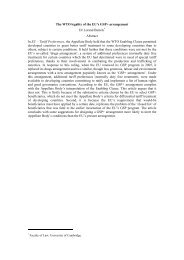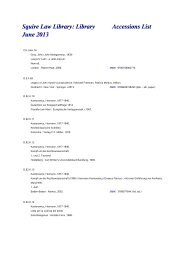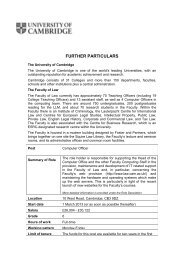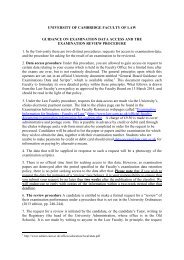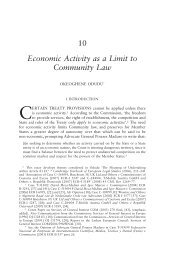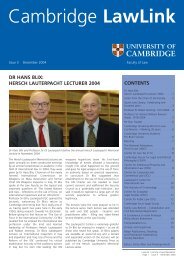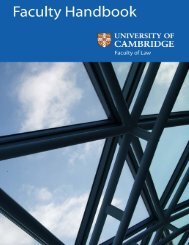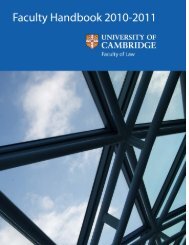LL.M. HANDBOOK 2011-20121. GENERAL GUIDANCE ON RESEARCHING AND WRITING INTHE LLMUseful PublicationsYou may find it useful to consult one <strong>of</strong> <strong>the</strong> several published guides to legal research andwriting, such as:ATH Smith, Learning <strong>the</strong> <strong>Law</strong> 14 th ed., (Sweet & Maxwell, 2010)Philip Thomas, Dane & Thomas: How to Use a <strong>Law</strong> Library 4 th ed. (Sweet &Maxwell, 2001)Peter Clinch, Using a <strong>Law</strong> Library: A Student’s Guide to Legal Research Skills, 2 nded., (Blackstone, 2001)Guy Holborn, Butterworths Legal Research Guide, 6 th ed., (Butterworths, 2010)Nicholas J McBride, Letters to a <strong>Law</strong> Student: A Guide to Studying <strong>Law</strong> at <strong>University</strong>(Pearson, 2 nd ed., 2010).Students from non-common law backgrounds may also find helpful James A. Holland andJulian S. Webb, Learning Legal Rules 4 th ed., (Blackstone, 1999).Keeping Records <strong>of</strong> your ReadingIt is essential right from <strong>the</strong> <strong>start</strong> <strong>of</strong> your research that you adopt a systematic method <strong>of</strong>keeping track <strong>of</strong> <strong>the</strong> materials which you have read. You can do this using a card index,with a separate card for each book or article, on which you record all <strong>the</strong> details needed tocite <strong>the</strong> item in full (date and place <strong>of</strong> publication, <strong>start</strong>ing and finishing page numbers <strong>of</strong> anarticle, etc.). Alternatively you can use s<strong>of</strong>tware programmes to achieve <strong>the</strong> same result.Regardless <strong>of</strong> <strong>the</strong> method you use to keep track <strong>of</strong> sources, you should always record <strong>the</strong>page numbers <strong>of</strong> any quotations you may wish to use. More generally, methodical recordkeepingwhen you are doing your reading can save you a lot <strong>of</strong> time looking things up againlater.Libraries and Research ResourcesThe research required for a <strong>the</strong>sis or an essay is very different from simply working from areading list. To find what you need, you will need to familiarise yourself with <strong>the</strong> variouslegal index systems, such as Current <strong>Law</strong>, <strong>the</strong> Index to Legal Periodicals, Halsbury’s <strong>Law</strong>s<strong>of</strong> England, etc, all <strong>of</strong> which are available in <strong>the</strong> Squire <strong>Law</strong> Library. Many <strong>of</strong> <strong>the</strong>seresources are also available online.If you access online resources through a computer which is part <strong>of</strong> <strong>the</strong> <strong>University</strong> network(such as a computer in <strong>the</strong> <strong>Faculty</strong> or your college) you will generally not need a password.If you access <strong>the</strong>se services from outside <strong>the</strong> <strong>University</strong> network, or o<strong>the</strong>rwise find youneed a password, you should generally use your RAVEN ID. This ID should be issued toyou at <strong>the</strong> <strong>start</strong> <strong>of</strong> term. If you have any problems logging in to any database, you shouldcontact one <strong>of</strong> <strong>the</strong> <strong>Faculty</strong> Computer Officers.26
LL.M. HANDBOOK 2011-2012Online services that are available allow you to search for U.K. legislation, case law, journalarticles and even newspaper stories. There is also access to a large number <strong>of</strong> overseasmaterials. Mr David Wills, <strong>the</strong> Squire <strong>Law</strong> Librarian, (email dfw1003@cam.ac.uk) can giveadvice on using <strong>the</strong> library to perform your research, and Mr Daniel Bates, (emaildb298@cam.ac.uk) <strong>the</strong> Freshfields Legal IT Lecturer, can give guidance on <strong>the</strong> use <strong>of</strong>online resources.<strong>University</strong> LibraryIn order to obtain <strong>the</strong> materials necessary to write your <strong>the</strong>sis, you may well need to makeuse <strong>of</strong> libraries o<strong>the</strong>r than <strong>the</strong> Squire. The <strong>University</strong> Library is <strong>the</strong> main research resourcein <strong>Cambridge</strong>. It is a legal deposit library, holding copies <strong>of</strong> all UK publications, as well as agood selection <strong>of</strong> overseas materials. You will find not only <strong>the</strong> usual books and academicperiodicals, but also an excellent Official Publications section (for Government research,statistics, etc.), and back copies <strong>of</strong> British newspapers. The U.L. also has <strong>the</strong> advantage <strong>of</strong><strong>of</strong>fering borrowing rights. Ano<strong>the</strong>r useful service <strong>of</strong>fered by <strong>the</strong> U.L. is <strong>the</strong> Inter-LibraryLoan system, by which you can obtain materials held in o<strong>the</strong>r libraries around <strong>the</strong> country.If you have never used <strong>the</strong> U.L. before, it is worth going to one <strong>of</strong> <strong>the</strong> introductory talkswhich are run <strong>the</strong>re at <strong>the</strong> beginning <strong>of</strong> <strong>the</strong> Michaelmas Term.O<strong>the</strong>r Departmental LibrariesDepending upon your area <strong>of</strong> research, you may also need to use o<strong>the</strong>r faculty anddepartmental libraries <strong>of</strong> <strong>the</strong> <strong>University</strong>, such as Economics, History, Criminology and LandEconomy. These are open to all members <strong>of</strong> <strong>the</strong> <strong>University</strong> on a non-borrowing basis. It ispossible to see where publications are held by using <strong>the</strong> online catalogue at one <strong>of</strong> <strong>the</strong>terminals in <strong>the</strong> Squire, in <strong>the</strong> U.L, in college computer rooms or by web access on yourown computer.Conducting your own Empirical ResearchAlthough most LLM <strong>the</strong>ses and essays are based upon <strong>the</strong> analysis <strong>of</strong> published materials,you may wish to embark upon some small-scale empirical research <strong>of</strong> your own, such asconducting a survey, or interviewing judges, police <strong>of</strong>ficers or o<strong>the</strong>rs involved in <strong>the</strong> legalprocess. Even if you do not have <strong>the</strong> time or <strong>the</strong> resources to ga<strong>the</strong>r data <strong>of</strong> any statisticalsignificance, <strong>the</strong> information which you collect may provide case studies to illustrate yourargument and add individuality to your work.Acknowledgement <strong>of</strong> SourcesEach <strong>the</strong>sis or essay should state <strong>the</strong> sources from which it is derived. The importance <strong>of</strong>this cannot be emphasised too strongly. Every time you make an assertion you shouldindicate <strong>the</strong> evidence upon which it is based, and every time you state a principle youshould refer to <strong>the</strong> case, or section <strong>of</strong> statute, or o<strong>the</strong>r authority from which it is derived. Ifyou are restating an argument based upon <strong>the</strong> ideas <strong>of</strong> a particular author, you shouldgenerally acknowledge this expressly (e.g “Bloggs has suggested that . . .”). This is all thatis needed if you are paraphrasing <strong>the</strong> argument, but whenever you are using <strong>the</strong> author’sown words, you need to show formally that you are doing so, using quotation marks, andgiving <strong>the</strong> exact source <strong>of</strong> <strong>the</strong> quotation, including <strong>the</strong> page number(s).27



